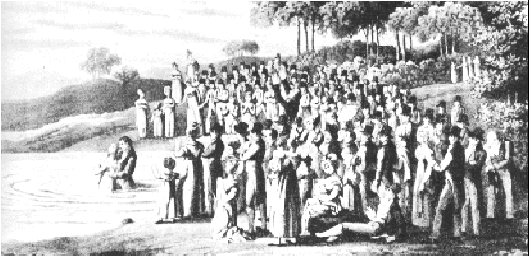|
|
| Wilkes County, North
Carolina |
The first reference to the Broyhill name in Wilkes County, North
Carolina is to Mary Broyhill who wed Nathaniel Brown in February of
1810. James Broyhill was the bondsman. On October 15th of
that year, James purchased two tracts of land, totaling 279 acres,
from William McGill on Warrior Creek in Wilkes County. James is
listed on the 1810 Census as living in Wilkes, but under the name of
James Bray. He does not appear on either the 1790 or 1800 North
Carolina Census. He apparently moved to Wilkes sometime between 1806
and 1809.
James and Rebecca and
their six children lived near the Earps and Hamptons, who had also
migrated from Pittsylvania County. Abednego Earp served in the
Revolutionary War and a comparison of military records shows that he and
James may have met earlier at Hillsboro. In any event, they
probably swapped "war stories". Other neighbors,
included the Gilreath and Davis Families, who had settled in Wilkes at
least twenty years earlier. Two of James' and Rebecca's children
would marry Hamptons; a third would marry a Davis. Their grand
daughter would marry an Earp and their great granddaughter would marry a
Gilreath.
On April 27, 1812, James
sold Morris Wood the 147 acres that he purchased on Childrey
Creek. This was probably the land he received from his father a
half dozen years earlier.
Warrior Baptist Church
was formed on May 1799, at Boomer, in an old log house on the waters of
Warrior Creek. It became Zion Hill Church in 1814 and James was
elected a deacon. James Broyhill next appears in Wilkes County records
on February 20, 1822, when he sold Richard Hood two tracts of land (No
money was given). The first was for 200 acres on a branch, which was
known as the old McGill place, and the second was for an unspecified
number of acres on the northwest corner of the first tract, adjacent
Josiah Dyer and a conditional line made between James Broyhill and John
N. Broyhill.
The Superior Court Minutes for
Wilkes County begin in 1807 and all have been searched from then through
1874. They show that on July 22, 1827 an inquisition was taken at the
home of James Broyhill to view the body of William Johnson, late of
Monroe County, Tennessee, lying dead. James was one of the jury that
viewed the body. William Johnson came to his death by accident by
William W. Wellborn firing his gun at a deer and not seeing the
deceased, as established by the testimony of James. |
 |
|
The rebellious colonists
had not only thrown out English government, but also its
Anglican
Church. Repeated waves of conversion to Protestantism swept the South.
The Baptist religion was well suited to the philosophy of many
Southerners. |
On October 12, 1828, James Broy Hill (two words) sold William Triplett 205 acres on Warrior Creek
adjacent to Spillsby Trible, on the conditional line between James Broy
Hill and David Brown, including five acres for the Mill; of that 60
acres where David Brown then lived. The tract was conveyed to James Broy
Hill by Jessee Hall, but no record of the transaction appears in Wilkes
Deeds Books.
In September of 1830, James
Broyhill brought suit against William W. Wellborn and Alfred Minton,
cause not given. It was continued through the March term of 1831 and the
March term of 1832. When finally heard in March of 1834, James was
represented by an agent. The case was resolved in favor of the
defendant. |
|